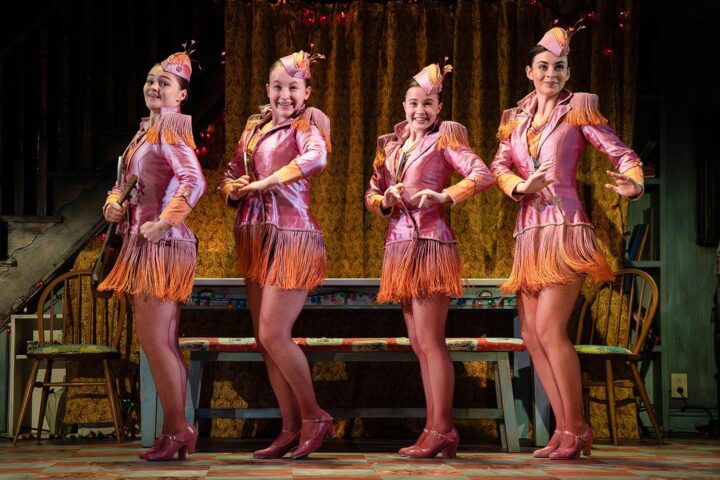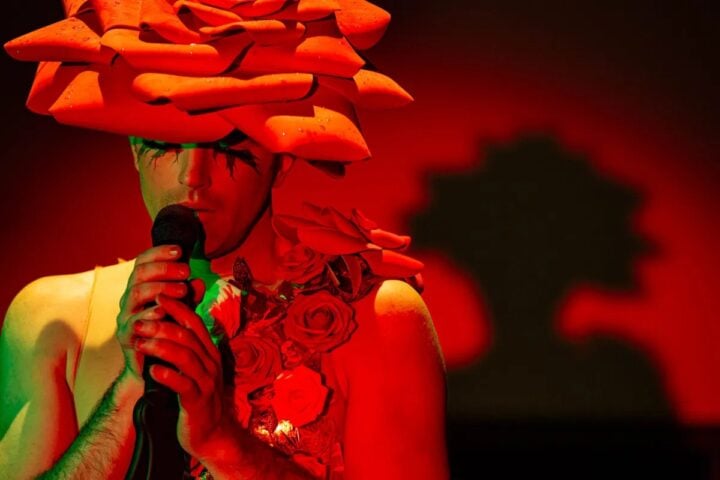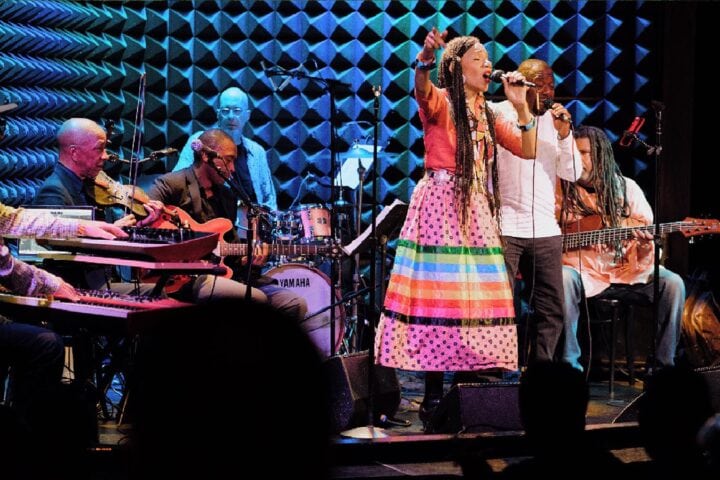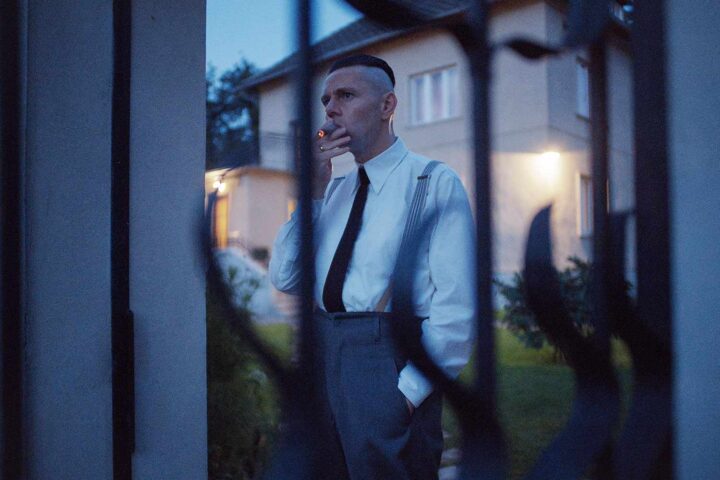Sometimes you look at the best shows across a year of New York theater and see clear trends, the patterns of storytelling or corners of the industry that seem to be thriving most artistically. In 2023, however, there was a happy diversity in the tapestry of the theater that resonated most deeply, from small-scale international entries at the Under the Radar Festival, to puntastic Broadway musical comedies, to potent new voices telling tender stories off-Broadway. Even in a year that often stretched New York theater to the breaking point financially, with several companies closing and nonprofits shortening their current seasons, theater artists were able to thrive and rediscover across the city’s stages.
If there’s a pattern to be found in the dozen selections below, it’s the two writers who show up twice. One is the late legend Stephen Sondheim, represented here by both the stunning revival of Merrily We Roll Along, long considered one of his weakest musicals but now utterly revivified, and the world premiere of Here We Are, the show he was writing with David Ives when he died. The other is Branden-Jacobs Jenkins with a Broadway staging of a decade-old play, Appropriate, and an off-Broadway production of a brand new work, The Comeuppance.
One trait that Sondheim and Jacobs-Jenkins share as writers is their often unmatched ability to capture the rhythmic eccentricities of how people communicate in a way that feels both verisimilitudinous and full of rigorous craft. Sondheim did that so well in song, and Jacobs-Jenkins, though not unmusically, achieves that in his sparkling dialogue. But their works excel at verbally constructing each and every character with crystalline specificity.
Appropriate, Hayes Theater
The last Broadway show to open in 2023 is also one of the year’s finest. Branden Jacobs-Jenkins finally makes his long-overdue Broadway debut with one of his own plays (he added a little bit of new material to Lincoln Center’s Skin of Our Teeth revival last year), and it’s a doozy. Sarah Paulson rips up the stage as Toni, the eldest of three siblings reunited to auction off their father’s Arkansas plantation. Jacobs-Jenkins builds tension like no one else, and the searingly unspoken demands of history—this family’s insurmountable inability to look a legacy of racial violence in the face—converts this living room drama into a state-of-the-nation thriller. In an era when subtext too often scares playwrights away from subtlety, Appropriate, which boasts deft direction from Lila Neugebauer, is daring enough to encompass both the tightly wound plot itself and the surging complexity that boils, almost unbearably, beneath the surface.
Are we not drawn onward to new erA, Under the Radar Festival
Belgian theater collective Ontroerend Goed’s Are we not drawn onward to new erA is a palindromic wonder. At first, this play seems like impenetrable avant garde as six actors assemble, one by one, to carry out a series of unexplained acts: They uproot a tree and pollute the air with huge hoses spraying dry ice, all while speaking a language that doesn’t sound quite like human speech. And, then, halfway through, a screen descends and we watch everything we’ve just seen with the tape played backward. They’re not polluting and tearing apart trees, but sucking up the smog and planting new vegetation; those strange utterances are actually English spoken backward, as the group debates how best to heal the trash heap of a world they’ve inherited. Are we not drawn onward to new erA proves that inventive theater artists can still generate refreshing theatrical surprises like this magic trick of a play.
Between Riverside and Crazy, Hayes Theater
Another Second Stage triumph, this one a 2015 Pulitzer Prize winning play finally alighting on Broadway, Between Riverside and Crazy is a celebration of collaboration. Stephen Adly Guirgis (most recently in New York in past seasons with the stunning Halfway Bitches Go Straight to Heaven) wrote the play specifically as a vehicle for the veteran actor Stephen McKinley Henderson. Henderson’s performance may be the year’s best: He embodies former police officer Walter Washington, seeking compensation for the career-ending gunshot wounds he received at the hands of another cop, with good-humored grace and a gently burning stubborn fierceness in his character’s quest for justice. Surrounded by whip-smart performances, especially the moving Victor Almanzar as the misguided Oswaldo, Henderson lights up the stage, guided by Austin Pendleton’s peppy direction. A play that ultimately seizes on its widowed hero’s capacity for joy, Between Riverside and Crazy opened the year on Broadway with warmth and wit.
The Comeuppance, Signature Theatre
The year’s best play, Branden Jacobs-Jenkins’s The Comeuppance is an epic that takes place on one porch during a high school reunion in the wake of Covid-19. Jacobs-Jenkins unpeels the two decades that lie between graduation day and the present for each of his five characters as they attempt to reconstruct their shared adolescence and reconnect on the precipice of tragedy. Exactly what that tragedy will be remains shadowy until the play’s end, but it feels, through the kind of effervescent existential terror that Jacobs-Jenkins excels at stirring up, inevitable. The Comeuppance is narrated by Death, speaking through each of the actors and visiting the reunion as much as the audience; a final chilling soliloquy on quarantine from Death’s perspective has haunted me the past six months. But as good as Jacobs-Jenkins is at writing otherworldly voices, his real supernatural gift is for human beings. No other contemporary playwright writes dialogue that feels this bracingly real and compellingly unpredictable.
Dead Man Walking, Metropolitan Opera
It’s not cheating to include the Met’s premiere of the 21st century’s most performed operatic work on a list of the year’s best theater, as the program notes define the work not as pure opera but as “a music drama, an opera musical, opera theater, or perhaps finally, American opera theater.” Dead Man Walking’s intensely dramatic impact comes from the marriage of composer Jake Heggie’s throbbing score and Terrence McNally’s flawless libretto. McNally’s adaptation of Sister Helen Prejean’s memoir of befriending a convicted murderer on death row received a searing production from Ivo van Hove that tastefully deployed one of his usual stage tricks—the projection of live footage from handheld cameras around the stage—to particularly potent effect. The complex characterizations behind the beautiful singing of Joyce DiDonato as Sister Helen, Ryan McKinney as the doomed prisoner, and Susan Graham as his devastated mother made this production a haunting meditation on forgiveness and justice.
Fat Ham, American Airlines Theater
A transfer from the off-Broadway Public Theater, James Ijames’s Fat Ham has become scrumptuously satiating now, meatier and far more meaningful than it was in its off-Broadway incarnation. Riffing on Hamlet, now set in the contemporary South on the day lost soul Juicy (Marcel Spears) watches his just-widowed mother marry his nasty uncle, Fat Ham is a ripely funny play that sets its Black, queer protagonist up against the debilitating inheritance of brutal ideals of masculinity. Spears finds such a specifically eloquent energy and language that it seems like the most natural thing in the world when he eventually slips seamlessly into one of Hamlet’s own speeches, truly earning its poetry. Ijames’s surprising finale, a feisty twist of theatrical rule-breaking, soars, reclaiming the narrative away from Shakespeare and the cultural constrictions of the American South as it celebrates the play’s characters in all their juicy humanity.
Here We Are, The Shed
With Stephen Sondheim’s final offering, a musical largely completed with the playwright David Ives before Sondheim’s death in 2021, the composer-lyricist sends one last jolt of structural inventiveness coursing through the veins of the musical theater form. Adapting two Luis Buñuel films, 1962’s The Exterminating Angel and 1972’s The Discreet Charm of the Bourgeoisie, Here We Are embraces its structural strangeness as it moves from a frothily weird and wonderful first act to an opaquely heartbreaking second act that—as has been widely reported—offers almost no music at all. What music there is, though, doesn’t disappoint. Sondheim’s score is decidedly within his most familiar vocabulary, a final master class in pressing music into the service of character. The cast, especially Rachel Bay Jones as a cloistered one-percenter making a quiet, bold attempt to extend her worldview beyond herself, approach the songs with sublime clarity, buoyed by Jonathan Tunick’s glorious orchestrations.
King Gilgamesh and the Man of the Wild, Under the Radar Festival
Another Under the Radar offering, King Gilgamesh & the Man of the Wild is a soul-stirring two-hander performed by co-creators Ahmed Moneka and Jesse LaVercombe with backing from the thrilling five-piece band Moneka Arabic Jazz. The piece intersperses the fictionalized meeting of Ahmed and Jesse (the actors play versions of themselves) in a Toronto café with scenes dramatizing the legendary friendship of the once-tyrannical King Gilgamesh and the monstrous Enkidu from the ancient Epic of Gilgamesh. King Gilgamesh & The Man of the Wild is the kind of play that feels both impossible and inevitable, a work of art that could only be dreamed up by this combination of artists asking the right questions at the right time in the right place.
Merrily We Roll Along, Hudson Theatre
I’ve always found Merrily We Roll Along to be Stephen Sondheim’s coldest score. So what director Maria Friedman excavated inside the music and story, alongside the glorious trio of Jonathan Groff, Daniel Radcliffe, and Lindsay Mendez, is nothing short of a miracle. Their performances radiate warmth and the musical’s unconventional structure—it charts the deterioration of friendship, moving backward through time—now seems to end on a note of hope rather than inescapable despair. Merrily We Roll Along had a ferocious intimacy at New York Theater Workshop at the start of the year, but it’s translated brilliantly to Broadway where this once-infamous flop now maintains an average ticket price around $250. This is the gold standard for what a revival can be: a directorial interpretation that digs deep into the work to amplify its strengths, quiet its flaws, and set it ablaze with inspired casting.
Primary Trust, Roundabout Theater Company
In Eboni Booth’s sweetly wrenching Primary Trust, William Jackson Harper’s Kenneth has worked in the same small-town bookstore for years and years, seldom venturing beyond those shelves and the tiki bar where he orders endless rounds of mai tais while chatting with his best friend Bert (Eric Berryman). But Bert is, to be blunt, imaginary, and when the bookstore closes, Kenneth must confront past traumas in order to stand a chance at living in a world outside of the one he’s constructed in his mind. Booth’s quicksilver comedy keeps Primary Trust moving at a brisk clip until its heartrending climax that Harper molds into one of the most gripping solo scenes of the year. Harper has a gift for finding gems of humanity within the absurd or the extreme. If Kenneth isn’t quite like anyone we’ve met, Harper demands our compassion.
Shucked, Nederlander Theater
Robert Horn’s punchline-a-minute book does the heavy lifting to make this heartwarmingly silly, punnily naughty musical the funniest show of the year. Songwriting Nashville superstars Brandy Clark and Shane McNally lean into their country roots to anchor the goofy characters in some kind of emotional reality, adding twangy depth to everyone in song. And then there’s Alex Newell as Lulu, with a barn-burning solo, “Independently Owned,” that earned them a Tony, the first for a non-binary performer, this past June. Especially in the cozy performances of Caroline Innerbichler, Andrew Durand, and Newell, Shucked finds a sweet spot nestled in among the puns that allows the show to end on a note that’s surprisingly warm and fuzzy.
Wolf Play, MCC Theater/Soho Rep/Ma-Yi Theater Company
Playwright Hansol Jung and director Dustin Wills have been everywhere off-Broadway this year: They teamed up to co-stage Jung’s semi-modern English Romeo and Juliet over the summer, Wills helmed the eccentric, disturbing Wet Brain at Playwrights Horizons, and Jung premiered a Wycherley and Kushner-inspired queer sex comedy Merry Me at New York Theater Workshop this fall. But their collaborative apex came earlier in the year with Wolf Play, Jung’s passionately rendered story of a couple who adopt a troubled boy through an Internet forum, gingerly becoming a family only to find themselves embroiled in a complex legal battle to keep the child they love. Wills’s inventive use of space, You-Shin Chen’s ramshackle set, and one very adorable puppet allow for some of the most creative storytelling of the year. Jung and Wills, in tandem, tell an urgent, moving story that seamlessly interweave style and substance.
Since 2001, we've brought you uncompromising, candid takes on the world of film, music, television, video games, theater, and more. Independently owned and operated publications like Slant have been hit hard in recent years, but we’re committed to keeping our content free and accessible—meaning no paywalls or fees.
If you like what we do, please consider subscribing to our Patreon or making a donation.






